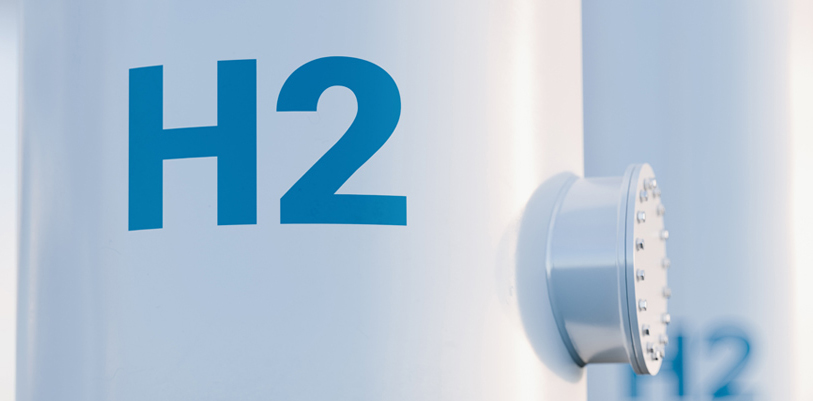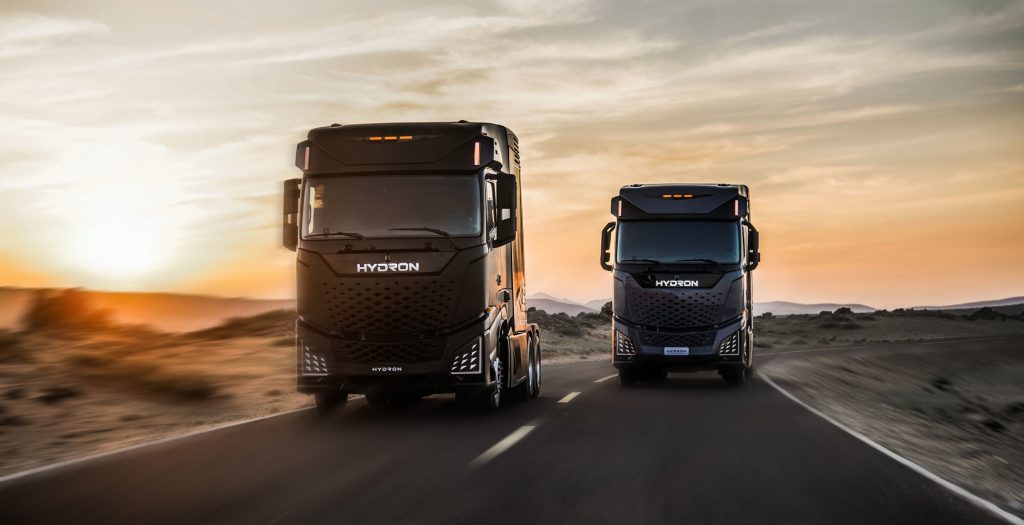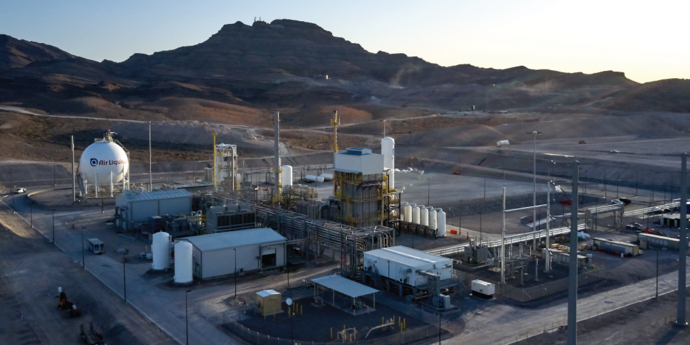Air Liquide officially opened its largest liquid hydrogen production and logistics infrastructure facility in North Las Vegas, Nevada. The plant aims to supply the growing needs for hydrogen mobility, but will also allow to provide hydrogen to a wide array of industries while the mobility market continues to mature.
The facility, and the associated logistics infrastructure, marks a $250 million investment by Air Liquide in the United States hydrogen market and will position Nevada as a leader in hydrogen energy production. Air Liquide’s investment created jobs for 700 contractors and 25 full-time jobs with the plant at full capacity. With this facility, Air Liquide also developed the infrastructure necessary to attract other companies to move into the area, creating additional jobs and new revenue for the city of North Las Vegas and the state of Nevada.
The North Las Vegas facility will produce 30 tons of liquid hydrogen per day which will be utilized by various customers, notably by those in the growing clean mobility market on the West Coast, especially California. The facility will be powered by fully renewable electricity. The facility can also use renewable natural gas to meet the California Low Carbon Fuel Standard (LCFS) when supplying the California mobility market. In this context, the facility can provide enough renewable hydrogen for over 40,000 fuel cell vehicles in California. This will significantly improve the hydrogen supply for mobility, a critical enabler for market growth.
In alignment with Air Liquide’s Sustainability Objectives, the North Las Vegas liquid hydrogen production facility aims to accelerate hydrogen development and contribute to the Group’s goal of at least tripling hydrogen sales in order to reach 6 billion euros, or nearly $6.5 billion USD, by 2035.
“This facility is an illustration of our commitment, and ability, to usher sustainable markets into the future, while creating jobs and fostering economic growth in the present. By providing a reliable supply of hydrogen to California’s mobility market and the region’s industrial customers, we are making a significant investment in the transition towards a more sustainable future, one with hydrogen at its core,” said Michael Graff, Chairman & CEO of American Air Liquide Holdings, Inc. and Executive Vice President, Air Liquide Group.
In full support of the 2015 Paris agreement, Air Liquide’s commitments address the urgency of climate change and energy transition, targeting carbon neutrality by 2050. As a pioneer in hydrogen, the Group is convinced that hydrogen is a cornerstone of the energy transition.

U.S. Department of Energy supports law to create clean hydrogen hubs
The U.S. Department of Energy (DOE) released a Notice of Intent (NOI) to fund the Bipartisan Infrastructure Law’s (BIL) $8 billion program to develop regional clean hydrogen hubs (H2Hubs) across America. H2Hubs will create networks of hydrogen producers, consumers, and local connective infrastructure to accelerate the use of hydrogen as a clean energy carrier. The production, processing, delivery, storage, and end-use of clean hydrogen is crucial to DOE’s strategy for achieving President Biden’s goal of a 100% clean electrical grid by 2035 and net-zero carbon emissions by 2050.
“Hydrogen energy has the power to slash emissions from multiple carbon-intensive sectors and open a world of economic opportunity to clean energy businesses and workers across the country,” said U.S. Secretary of Energy Jennifer M. Granholm. “These hydrogen hubs will make significant progress towards President Biden’s vision for a resilient grid that is powered by clean energy and built by American workers.”
Hydrogen energy has the potential to decarbonize multiple economic sectors, including heavy-duty transportation and steel manufacturing, create good paying jobs, and pave the way towards a grid powered by clean energy resources. Today, the U.S. produces about 10 million metric tons of hydrogen annually, compared to approximately 90 million tons produced per year globally. While most of the hydrogen produced in the U.S. comes from natural gas through steam methane reforming, electrolysis technology – which uses electricity to produce hydrogen from water – is an emerging pathway with dozens of installations across the country. This technology could produce hydrogen using clean electricity from renewable energy including solar, wind and from nuclear power.
The selection of the regional H2Hubs will utilize cross-office collaboration and consider factors such as environmental justice, community engagement, consent-based siting, equity, and workforce development.
DOE will select proposals that prioritize employment opportunities and address hydrogen feedstocks, end uses, and geographic diversity. The NOI provides a high-level draft plan for DOE’s current vision to meet the BIL requirements for the H2Hubs, which will be supported by DOE’s Office of Clean Energy Demonstration and Hydrogen and Fuel Cell Technologies Office.
The Bipartisan Infrastructure Law’s H2Hubs will support DOE’s ongoing initiative designed to bring together stakeholders to help drive down the cost of advance hydrogen production, transport, storage, and utilization across multiple sectors in the economy.

US: new startup created to develop hydrogen-fueled autonomous trucks
Mo Chen, a Canadian entrepreneur Co-Founder of San Diego-based autonomous driving company TuSimple, has started a new company, Hydron, committed to developing, manufacturing, and selling hydrogen-powered trucks equipped with L4 autonomous driving technology. Chen is set on transforming long-haul freight transportation through hydrogen-powered autonomous trucks making trucking safer, cleaner, and more efficient, minimizing the carbon footprint of class 8 heavy-duty trucks globally.
TuSimple was founded in 2015, and quickly attracted the attention of global logistics giant UPS, who invested in the company back in 2019. In December of 2021, TuSimple cemented its status as the leader in the development of AI-powered autonomous driving software by becoming the first and only company to successfully operate long-haul heavy-duty trucks autonomously on open public roads without a human in the vehicle and without remote intervention.
“The path to commercializing autonomous vehicles requires the complex integration of both hardware and software,” said Mo Chen, CEO at Hydron. “The biggest challenge in bringing autonomous driving to the market at scale is not software development, but access to reliable mass production hardware, and now with Hydron, we will be able to provide automotive-grade hardware specifically for autonomous networks.”
Through several partnerships, Hydron plans to deliver both hydrogen-powered autonomous trucks and refueling infrastructure to become a complete solution provider for autonomous driving companies, commercial fleets, and leading carriers. Hydron also plans to collaborate with partners to build a manufacturing facility in North America to better meet the U.S. supply chain challenges. The first generation of Hydron trucks is expected to enter mass production in Q3 of 2024.







